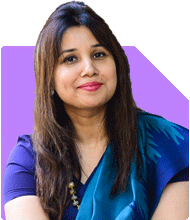Kanchan Rai |656 Answers |Ask -Follow
Relationships Expert, Mind Coach - Answered on Apr 29, 2024
Rai has a degree in leadership development and customer centricity from Harvard Business School, Boston. She is an internationally certified coach from the International Coaching Federation, a global organisation in professional coaching.... more

Hi, I have a divorcee daughter aged 45 whose unpleasant and quarrelsome behavior is a constant source of misery and headache for whole of the family. Her marriage could not go beyond 2 months as her in-laws turned out to be greedy, troublesome and also found involved in some fraudulent activities with a few police cases against them -- which forced us to seek divorce. I may add that my daughter ever since she was 13 or 14 yrs became a little self-willed and considered her to be always right in action and thought in front of parents or any one else. This has become very serious now. She is not at all open to any kind of reasoning or discussion. If you always act, think or do as per her wish, it is ok otherwise she will start fighting on any thing or every thing. Her attitude of selfishness and always finding faults with other family members including parents is spoiling the peaceful atmosphere of the house. Expecting any kind of adjustment from her is asking for the moon. Kindly advise.
I can understand how challenging it must be to deal with your daughter's behavior. It's concerning that she's been displaying this attitude since she was young and that it's causing such turmoil within your family.
Consider seeking the help of a family therapist or counselor who specializes in dealing with family conflicts. A professional can provide an objective perspective and offer strategies for improving communication and resolving conflicts.It's important to establish clear boundaries with your daughter regarding her behavior. Let her know what behaviors are unacceptable and what consequences will follow if those boundaries are crossed.
Encourage Open Communication: Even though your daughter may be resistant to discussion, continue to encourage open communication within the family. Let her know that you're willing to listen to her perspective and work together to find solutions. Instead of solely focusing on her negative behavior, try to reinforce positive behaviors when you see them. Praise her when she acts respectfully or cooperatively, and try to reinforce those behaviors. Show your daughter how to communicate effectively and resolve conflicts peacefully by modeling those behaviors yourself. Avoid getting drawn into arguments or confrontations, and instead, try to remain calm and rational.If your daughter is open to it, encourage her to seek therapy on her own. A therapist can help her explore the underlying reasons for her behavior and develop healthier coping mechanisms.
Encourage Self-Reflection: Encourage your daughter to reflect on her behavior and its impact on herself and others. Help her recognize the importance of empathy and understanding in maintaining healthy relationships.
It may take time and patience, but with consistent effort and support, there is hope for improvement. Remember to take care of yourselves and seek support from other family members or friends if needed.
You may like to see similar questions and answers below
Aruna Agarwal | Answer |Ask -Follow
Child and Parenting Counsellor - Answered on Jul 15, 2023
Anu Krishna |1769 Answers |Ask -Follow
Relationships Expert, Mind Coach - Answered on Feb 08, 2024
Kanchan Rai |656 Answers |Ask -Follow
Relationships Expert, Mind Coach - Answered on Sep 08, 2024
Kanchan Rai |656 Answers |Ask -Follow
Relationships Expert, Mind Coach - Answered on Feb 21, 2025
Mayank Chandel |2636 Answers |Ask -Follow
IIT-JEE, NEET-UG, SAT, CLAT, CA, CS Exam Expert - Answered on Mar 04, 2026
Mayank Chandel |2636 Answers |Ask -Follow
IIT-JEE, NEET-UG, SAT, CLAT, CA, CS Exam Expert - Answered on Mar 04, 2026
Mayank Chandel |2636 Answers |Ask -Follow
IIT-JEE, NEET-UG, SAT, CLAT, CA, CS Exam Expert - Answered on Mar 04, 2026
Mayank Chandel |2636 Answers |Ask -Follow
IIT-JEE, NEET-UG, SAT, CLAT, CA, CS Exam Expert - Answered on Mar 04, 2026
Mayank Chandel |2636 Answers |Ask -Follow
IIT-JEE, NEET-UG, SAT, CLAT, CA, CS Exam Expert - Answered on Mar 04, 2026
Mayank Chandel |2636 Answers |Ask -Follow
IIT-JEE, NEET-UG, SAT, CLAT, CA, CS Exam Expert - Answered on Mar 04, 2026
Mayank Chandel |2636 Answers |Ask -Follow
IIT-JEE, NEET-UG, SAT, CLAT, CA, CS Exam Expert - Answered on Mar 04, 2026
Mayank Chandel |2636 Answers |Ask -Follow
IIT-JEE, NEET-UG, SAT, CLAT, CA, CS Exam Expert - Answered on Mar 04, 2026
Ravi Mittal |707 Answers |Ask -Follow
Dating, Relationships Expert - Answered on Mar 04, 2026
Dr Nagarajan J S K |2623 Answers |Ask -Follow
NEET, Medical, Pharmacy Careers - Answered on Mar 04, 2026




















